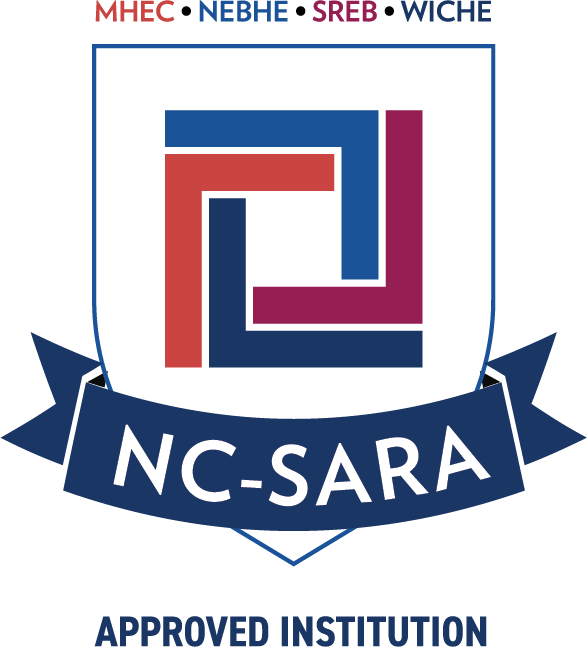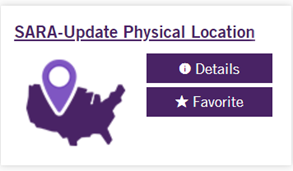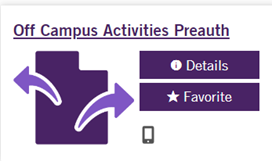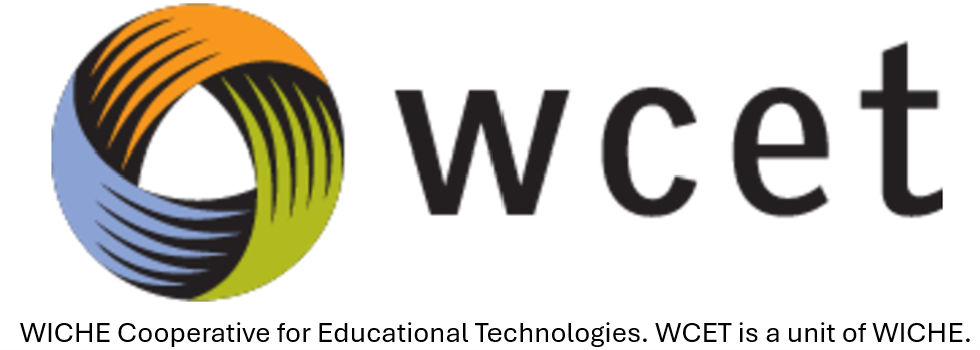WSU State Authorizations
WSU/Utah participates in the National Council for State Authorization Reciprocity Agreements (NC-SARA) and Weber State University (WSU) is an approved SARA institution, which means we adhere to established standards for offering post-secondary e-learning programs in all participating states.
All WSU fully online programs are currently authorized in all states; however there may be restrictions in certain non-SARA states regarding internships and practicums.
Per federal law, students who have petitions/complaints against the school relating to fraud, false advertising, or other deceptive practices can report their petitions/complaints to Weber State University by following the Student Petition/Complaint Process.

Weber State University has been approved to participate in the National Council for State Authorization Reciprocity Agreements.
What does that mean to me?
WSU’s online courses and programs are available to students in all SARA-participating states. The SARA agreement also governs activities such as internships, externships, field experiences, clinical placements and more. If you are interested in WSU’s programs that lead to professional licensure, please review the regulations to ensure you will be eligible to sit for licensure in your state or states you are contemplating residing in.
State authorization refers to the processes institutions must follow to ensure all legislative requirements are met in all states where WSU students are located. WSU is a SARA approved institution and follows the required guidelines. For more information about SARA, please visit the SARA website.
Professional Licensure Information
Professional Licensure 101 & FAQ
If you are considering enrolling in a program that leads to a professional license, we highly recommended that you contact the appropriate state licensing agency in your state or the state where you intend to work to seek the most up-to-date information about state licensure requirements before beginning the program.
PLEASE NOTE:
Weber State makes reasonable efforts so that its program of study curricula aligns with and meets the educational for professional licensure. It also makes reasonable efforts so that its state-professional licensure information is current. However, professional licensure requirements are frequently revised and may involve non-educational requirements (e.g. licensing exams; experience, etc.).
It is advisable to review the most up-to-date professional licensure requirement in the state where you plan to work.
For licensing board contact information, licensure requirements and program approval status, please see below.
Have questions about professional licensure requirements?
Contact the State Authorization team.
Information for International Students
Weber State University works to provide global access to its online degree and certificate programs. While we carefully track issues related to international authorization and licensure, it is a student’s responsibility to understand requirements related to whether an online degree or certificate will be recognized in a country other than the United States, how the collection of student data may be used in another country, and whether withholding taxes (in addition to the price of tuition) will apply.
Some countries may not formally recognize foreign online degrees and certificates, which may have implications for students who later seek to enroll in other educational programs, or for those who seek employment with that country’s government or other employers requiring specific credentials.
If you’re considering enrolling in an online program that leads to a professional license, contact the appropriate professional licensing board in your country of residence or the country where you intend to work in order to determine whether an online degree or certificate from Weber State will be recognized.
Weber State University complies with the Federal Higher Education Act regulations on State Authorization. CFR references noted below within the Higher Education Act (HEA) leans into consumer protection and gainful employment.
HEA can impact an Institution’s Title IV and therefore impacts faculty, staff, & students.
State Authorization Network (SAN) has compiled the State and Federal compliance items noted in the below excerpt. https://wcetsan.wiche.edu/state-authorization/why-comply
Two applications/channels can be found within the eWeber portal applicable to State Authorization:
Contact us:
Weber State University has a dedicated website and email to assist in questions regarding State Authorization.
Website: https://continue.weber.edu/wsuonline/state-authorization/
Email: Email WSU State Authorization
WSU, as a participant of NC-SARA, meets Federal Regulations for State Authorization, with the exception of those involving ‘Physical Presence Triggers.’
As a faculty or staff member of a SARA-participating institution, you must adhere to important policies and standards to ensure compliance practices are being followed for your programs and courses. This helps WSU expand its quality educational offerings to students across the U.S./Territories.
- State authorization applies to any university activity that occurs outside of Utah, and can include regular activities such as recruiting, advertising, internships/practicums, or field experience.
- State authorization regulations apply to all out-of-state university activities, regardless of whether a program is available online.
- Regulations on out-of-state activities vary from state to state, and from program to program. While some states require any activity conducted by an out-of-state institution grounds to seek authorization, many states apply conditional rules, known as “physical presence triggers.”
- As with most state authorization issues, these triggers are dependent on the type of program, duration of activity, state of residence for the student, and other factors that must be evaluated individually to determine whether authorization will be required.
- The resources below are intended to provide departments and faculty with basic information regarding WSU’s authorization status (including approved, exempted, or triggering activities such as internships) in other states and should be used as guidelines.Please verify authorization prior to all out-of-state activities by submitting the ‘Off Campus Activities’ form within eWeber portal. Regulations and requirements can change quickly, and the WSU-State Authorization Office can provide you with the most current information
Nationally: State Authorization Network (SAN) and the Federal regulations are noted below:
Federal Compliance
Failure to comply with the Federal regulations may impact participation in Title IV, HEA Programs including: Federal Pell Grant program, the Federal Supplemental Educational Opportunity Grant, the Federal Work-Study program, the Teacher Education Assistance for College and Higher Education (TEACH) Grant program, Federal Family Educational Loan Program, and the William D. Ford Direct Loan program.
2019 Final Federal Regulations for State Authorization that were developed from the 2019 Negotiated Rulemaking became effective July 1, 2020.
2023 Final Federal Regulations for State Authorization (34 CFR 668.14(b)(32)(ii)) stipulate students are only able to enroll in Programs of Study that meet the respective State licensure requirements where the student is physically located or where the student attests to seek employment after graduation became effective July 1, 2024.
Please contact the WSU-State Authorization team for more information at stateauthorization@weber.edu
- 34 CFR 600.2 - Definitions (state authorization reciprocity agreement)
- 34 CFR 600.9(c) - State Authorization (for distance education)
- 34 CFR 668.43(a)(5)(v)- Institutional Information (public notifications for programs leading to professional licensure or certification)
- 34 CFR 668.43(c) - Institutional Information (individualized notifications for programs leading to professional licensure or certification)
State Compliance
States maintain the authority to regulate out-of-state post-secondary institutions that offer or participate in activities located in their state to protect students as consumers, the general public, and other interests of the state. Institutions must follow the State laws and regulations of the state where an institution's activity takes place.
Higher Education Agency Approval:
- These activities could include, but are not limited to; online courses, experiential learning, marketing, recruiting, servers, proctoring, tutoring, face to face meeting, brick and mortar structures, renting a location, or a faculty member teaching a course online from the state.
- Some or all of these activities could cause the institution to be legally required to seek an approval from the higher education agency of the state.
- The states vary as to the regulated activities, application process, renewal process, required surety bonds, annual reporting, and annual fees.
- Institutions must determine what activities occur out-of-state and in which states these activities occur to know which state's laws must be upheld or face consequences.
Consequences for noncompliance may vary per state, but could include fines, accreditation problems, lawsuits, cease and desist letters, barring licensure for regulated professions, and even the concern of bad publicity for the institution. Note that state higher education agencies have attempted to minimize consequences by assisting institutions to attain compliance in the interest of best serving students.
State Professional Licensure Boards:
Approvals for programs leading to professional license by the state professional boards are in addition to compliance with the state higher education agency.
Compliance by Reciprocity (SARA)
An alternative to obtaining individual state institutional approval and managing the fees, reporting, and applications for each state for many distance education related activities, is to gain institutional approval for activities through reciprocity as a SARA participating institution. The State Authorization Reciprocity Agreements (SARA) provides SARA participating institutions with the approval by their home state to offer and participate in certain designated activities related to distance education in other SARA states as described in the SARA manual. SARA is a voluntary agreement among states to provide uniform oversight and impose uniform institutional responsibilities in members states for the designated activities.
Compliance for institutions to offer and participate in out-of-state activities under SARA Policy in other SARA states is specified through the acknowledgements of responsibilities affirmed by the chief executive officer (CEO) or chief academic officer (CAO) of the institution at the time of initial application and at each annual renewal to SARA. The SARA Manual is the principal policy and operations document for which institutions should be thoroughly familiar as SARA participating institutions.
SARA does not cover professional licensure board approvals, international compliance, tax implications for employees, workers compensation insurance, or Secretary of State, Treasury, or Revenue registration.
You may or may not know that Federal regulations require students to self-report their physical location each semester. Whether you are taking courses or participating in an activity within or outside the Host-state (Utah), WSU must show that students have provided this information for future accreditation requirements.
If you have any questions and/or concerns regarding your location and any disclosures, please contact your Department's academic advisor or the WSU-State Authorization Team. We wish you continued success in your educational endeavors!
*Weber State University is a Utah public institution of higher education within USHE.
USHE has representation within WICHE. Please read the below blog:
Power of Collaboration - WCET Frontiers Blog: ‘How they work together to HELP OUR STUDENTS’
For additional information please visit these sites.







